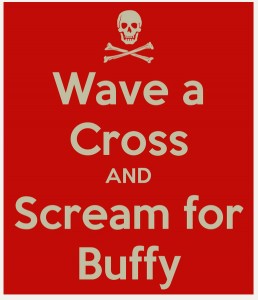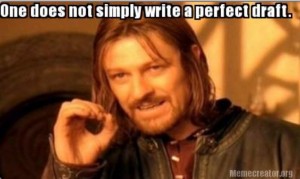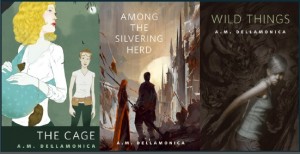There are those who would have you believe that great fiction is written, primarily, by tormented, half-starved, garret-living addicts who weep out their epics, word by word, in random fits of Muse-fired productivity that alternate with binges, orgies, getting dumped, going through withdrawal, and embarking on the occasional sordid, scorched-boudoir battle with head lice, bedbugs, and despair.
I don’t really buy into this idea, myself. I’m far too invested in my comfortable, three squares a day plus Internet lifestyle. But I will say that there are things about writing that can make you absolutely bonkers. And by bonkers I mean a little obsessive, a lot frustrated, and plenty convinced that everyone’s writing more, selling more, and having an easier time of it.
My problem with this is that while you’re doing all that, you’re probably not writing fiction. You’re probably not being happy about the fact that you have the opportunity to do so. Having the leisure to make art is a privilege, a kind of wealth, and like all such things it’s not allocated equally to all the people of this world.
I should say up front I don’t think writers are especially different from other people in this regard. Most of us have some ability to ignore our lives’ myriad blessings, while whipping ourselves into all-consuming frenzies over car repairs or our love lives or stuff about work or our favorite TV show. But with writers, there are some standard things we chase around the mouse-wheels of our minds:
–I didn’t write 2000 words today, and Joe Scribe does twice that daily!
–I just realized my plot is a direct lift from Much Ado about Nothing!
–I checked my Amazon Sales Ranking forty times today and it was five, then nine, then seven, then four. . . how did it fall to nine?
A lot of the time, the things we obsess over have to do with publishing.
Writing and publishing are two different activities. Yes, they’re inextricably bound, unless you’re filing your manuscripts in an online archive for an audience of you and you alone. As writers, we’re looking to communicate. To tell stories, evoke emotions, to create memories of people and places that exist only in the minds of ourselves and our audiences.
When we’re writing, those stories and the people in them belong to us. When we finish a piece and do the publishing thing to it, we’re offering our work up to editors and audiences. Publishing your work is sharing it, basically, and that makes it less than 100% your own. And somehow this sharing process involves entangling creativity–the making of art–with the business of getting that finished creation to other people.
There’s collaboration involved, and money. The success you achieve in the sharing of your work is often seen as a measure of how well you’ve written it… even though we all know about great books that have been commercial failures, and bad ones that had roof-busting sales. (This is another thing you can make yourself bonkers over, if you choose.)
A thing about publishing is there’s a lot within the process that’s outside of author’s control.
–You can’t affect a magazine’s per-word rate for fiction. What they pay is what they pay.
–You can’t affect how fast someone will get back to you on a submission.
–They’re either gonna say yes, no, or perhaps rewrite it and we’ll see.
–Illustration? Design? Cover art? Decided by others.
–You can’t make a reviewer like you.
You see what I mean, right? Here you are, writing a novel, in total control of every aspect of each character’s life: how they look, what they wear, whether they lost their parents in a tragic Yurt fire or crashed a car into the Thames. And then you finish the book and offer it up to the world, and from there… well, it’s easy to feel like a leaf, ripped off a tree and aloft on uncaring winds.
Some of us deal with this well, others less so.
What’s the answer? Some say it’s self-publishing. And, indeed, there’s a lot more in your hands there: you get to say how the finished product looks, when it comes out, set the price point, figure out who handles which of the thousands of tasks within the production process . . .
. . . but who reads your book, what they think of it, whether they’ll shell out for your sequel or devote a few minutes of their precious time to putting up the ever crucial user review?
That’s still out of your hands.
So as you embark on publishing, learn to identify your own personal bonkers-making buttons. As far as you’re able, find genius ways to not push ’em.
Artists get into the creative racket, I hope, out of a deep impulse to experience the joy of creation. For writers it’s love of story, language, wordplay, the thrilling challenge of figuring out how to pull off beginning-middle-end or perfectly sketch out a hero’s journey. We want to thrill, scare, entertain, communicate–we want to reach out with our imaginations and and write new information into strangers’ brains.
And I hope most of us enjoy the hell of out of doing it.
So, in the vast, muddled-seeming mix of wondering what’s hot now, angsting over your daily word count, wondering if an agent will take you, and wishing that short story submission you put out six months ago would come back with an acceptance on it, what can you control?
–You can decide what you want to write.
–You can decide how much time and effort you spend on it.
–As much as possible, you can find ways to enjoy the process of creation, from the first glimmerings of a novel idea, on to the parts where you bounce up against the wall of “Damn! Writing is Hard!” and from there to the point where you get to write “The End.”
–You can push through the tough stuff to the rare, life-changing, purely revelatory moments. (And there are revelations, I promise–searing moments of clarity, about craft and yourself and the nature of human existence–times when you’ll know in your marrow that you couldn’t possibly be doing anything better with your life.)
If there’s no joy, if you’re not having fun, at least most of the time, what are the chances you’re making anything worth reading?
Thus endeth my pitch for not buying yourself a garret and a year’s supply of your favorite addictive substance: write often, try hard, stay healthy and one way or another please yourself. Write things you think are so damned cool you can’t wait to tell someone about them. Invent characters you love, pit them against clever, committed, backbreaking adversaries, beat the hell out them and cheer when they come out on top. Sketch out scenes that work perfectly well, only to decide you need a few lines of candy. . . and then go write in that clever bit of character interaction your writersoul is craving. It can come out in rewrite if it must, but just see what playing gets you.
Art is a pristine and endless beach, covered in multicolored sand. Go make yourself some sparkly pink castles.
 This week’s rewatch covers the episode “Help,” which is the one where a young teen predicts her death, and Buffy tries to stop it.
This week’s rewatch covers the episode “Help,” which is the one where a young teen predicts her death, and Buffy tries to stop it.










